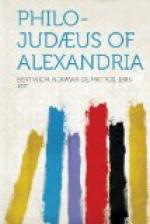at which, according to Josephus,[54] over two million
people assembled, must, indeed, have been a striking
symbol of the unity of the Jewish race, which was at
once national and international; magnificent embassies
from Babylon and Persia, from Egypt and Cyrene, from
Rome and Greece, even from distant Spain and Gaul,
went in procession together through the gate of Xistus
up the temple-mount, which was crowned by the golden
sanctuary, shining in the full Eastern sun like a
sea of light above the town. Philo describes
in detail the form of the edifice that moved the admiration
of all who beheld it, and for the Jew, moreover, was
invested with the most cherished associations.
Its outer courts consisted of double porticoes of
marble columns burnished with gold, then came the inner
courts of simple columns, and “within these stood
the temple itself, beautiful beyond all possible description,
as one may tell even from what is seen in the outer
court; for the innermost sanctuary is invisible to
every being except the high priest.” The
majesty of the ceremonial within equalled the splendor
without. The high priest, in the words of Ben
Sira (xlv), “beautified with comely ornament
and girded about with a robe of glory,” seemed
a high priest fit for the whole world. Upon his
head the mitre with a crown of gold engraved with
holiness, upon his breast the mystic Urim and Thummim
and the ephod with its twelve brilliant jewels, upon
his tunic golden pomegranates and silver bells, which
for the mystic ear pealed the harmony of the world
as he moved. Little wonder that, inspired by the
striking gathering and the solemn ritual, Philo regarded
the temple as the shrine of the universe,[55] and
thought the day was near when all nations should go
up there together, to do worship to the One God.
Sparse as are the direct proofs of Philo’s connection
with Palestinian Judaism, his account of the temple
and its service, apart from the general standpoint
of his writings, proves to us that he was a loyal
son of his nation, and loved Judaism for its national
institutions as well as its great moral sublimity.
His aspiration was to bring home the truths of the
religion to the cultured world, and therefore he devised
a new expression for the wisdom of his people, and
transformed it into a literary system. Judaism
forms the kernel, but Greek philosophy and literature
the shell, of his work; for the audience to which
he appealed, whether Jewish or Gentile, thought in
Greek, and would be moved only by ideas presented
in Greek form, and by Greek models he himself was
inspired.
Philo’s first ideal of life was to attain to
the profoundest knowledge of God so as to be fitted
for the mission of interpreting His Word: and
he relates in one of his treatises how he spent his
youth and his first manhood in philosophy and the
contemplation of the universe.[56] “I feasted
with the truly blessed mind, which is the object of
all desire (i.e., God), communing continually




